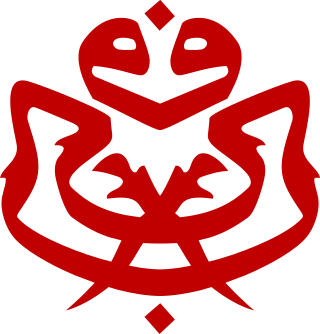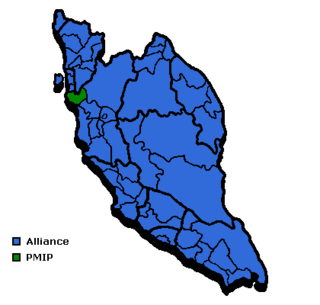Related Research Articles
Politics of Malaysia takes place in the framework of a federal representative democratic constitutional monarchy, in which the Yang di-Pertuan Agong is head of state and the Prime Minister of Malaysia is the head of government. Executive power is exercised by the federal government and the 13 state governments. Legislative power is vested in the federal parliament and the 13 state assemblies. The judiciary is independent of the executive and the legislature, though the executive maintains a certain level of influence in the appointment of judges to the courts.

The Malaysian Indian Congress,formerly known as Malayan Indian Congress, is a Malaysian political party. It is one of the founding members of the coalition Barisan Nasional, previously known as the Alliance, which was in power from when the country achieved independence in 1957 until the elections in 2018. The party was among the first to fight for Malayan Independence and is one of the oldest parties in Malaysia.

TunkuAbdul Rahman Putra Al-Haj ibni Almarhum Sultan Abdul Hamid Halim Shah was a Malaysian statesman and lawyer who served as the first prime minister of Malaysia and the head of government of its predecessor states from 1955 to 1970. He was the first chief minister of the Federation of Malaya from 1955 to 1957. He supervised the independence process that culminated on 31 August 1957. As an independent Malaysia's first prime minister, he dominated the country's politics for the next 13 years.

The United Malays National Organisation (UMNO), officially Pertubuhan Kebangsaan Melayu Bersatu (PEKEMBAR), is a nationalist right-wing political party in Malaysia. As the oldest national political party within Malaysia, UMNO has been known as Malaysia's "Grand Old Party".

The Malaysian People's Party is a dormant political party in Malaysia. Founded on 11 November 1955 as Partai Ra'ayat, it is one of the older political parties in Malaysia and traces its pedigree to the anti-colonial movements from the pre World War II period like the Kesatuan Melayu Muda.

Tun Sir Tan Cheng Lock KBE, SMN, DPMJ, JP was a Malaysian Peranakan businessman and a key public figure who devoted his life to fighting for the rights and the social welfare of the Chinese community in Malaya. Tan was also the founder and the first president of the Malayan Chinese Association (MCA), which advocated his cause for the Malayan Chinese population.

Ketuanan Melayu is a political concept that emphasises Malay power and preeminence in present-day Malaysia. The Malaysian Malays have claimed a special position and special rights owing to their longer history in the area and the fact that the present Malaysian state itself evolved from a Malay polity. The oldest political institution in Malaysia is the system of Malay rulers of the nine Malay states. The British colonial authorities transformed the system and turned it first into a system of indirect rule, then in 1948, using this culturally based institution, they incorporated the Malay monarchy into the blueprints for the independent Federation of Malaya.

The Reid Commission was an independent commission responsible for drafting the Constitution of the Federation of Malaya prior to Malayan independence from the United Kingdom on 31 August 1957.

Malay nationalism refers to the nationalism that focused overwhelmingly on the Malay anticolonial struggle, motivated by the nationalist ideal of creating a Bangsa Melayu. Its central objectives were the advancement and protection of Malayness: religion (Islam), language (Malay), and royalty. Such pre-occupation is a direct response to the European colonial presence and the influx of a foreign migrant population in Malaya since the mid-nineteenth century.

Tun Thirunyanasambanthan s/o Veerasamy, also known as V.T. Sambanthan, was a Malayan and Malaysian politician who served as Minister of National Unity from January 1972 to 1974, Minister of Works, Posts and Telecommunications from April 1956 to December 1971, Minister of Health from 1957 to 1959, Minister of Labour from 1955 to 1957, Member of Parliament (MP) for Sungai Siput from July 1955 to June 1973, acting Prime Minister on 3 August 1973 for only 10 days and 5th President of the Malayan Indian Congress and later Malaysian Indian Congress (MIC) from May 1955 to his removal from the party presidency in June 1973 by the party members. He is widely known as one of the founding fathers of Malaysia representing one of the three main ethnicities, people of Indian origin along with Tunku Abdul Rahman representing Malay ethnicity and Tan Cheng Lock representing the Chinese ethnicity.

The Independence of Malaya Party was a political party in British-ruled Malaya that stood for political independence. Founded by Onn Ja'afar after he left UMNO in 1951, it opposed the UMNO policy of Malay supremacy.
Dato' Sir Ernest Emmanuel Clough Thuraisingham or E.E.C. Thuraisingham was the first local Member (Minister) for Education in the Communities Liaison Committee (CLC) formed to build communal fraternity in British-ruled Malaya, from 1951–1955. He is also the first Asian chairman of the Selangor Turf Club.

V. Manickavasagam Pillai was a Malaysian politician who served as Minister of Communications. He was a member and served as 6th President of the Malaysian Indian Congress (MIC), a component party of the ruling Barisan Nasional (BN) coalition from June 1973 to his death in October 1979.
John Thivy (1904–1959) was a Malayan Indian politician and former lawyer who was the founding president of the Malayan Indian Congress.

General elections were held in the Federation of Malaya on Wednesday, 27 July 1955, the only general election before independence in 1957. They were held to elect members of the Federal Legislative Council, whose members had previously been fully appointed by the British High Commissioner. Voting took place in all 52 federal constituencies, each electing one member. State elections also took place in all 136 state constituencies in nine states of Malaya and two settlements from 10 October 1954 to 12 November 1955, each electing one councillor to the State Council or Settlement Council.

The Labour Party of Malaya was a political party in Malaya that was active between 1952 and 1969. It was originally formed as a confederation of state based labour parties known as the Pan-Malayan Labour Party (PMLP).

The Alliance Party was a political coalition in Malaysia. The Alliance Party, whose membership comprised United Malays National Organisation (UMNO), Malaysian Chinese Association (MCA) and Malaysian Indian Congress (MIC), was formally registered as a political organisation on 30 October 1957. It was the ruling coalition of Malaya from 1957 to 1963, and Malaysia from 1963 to 1973. The coalition became the Barisan Nasional in 1973.

The Baling Talks were held in northern Malaya on 28 and 29 December 1955 in an attempt to resolve the Malayan Emergency situation.

Colonel Tun Sir Henry Lee Hau Shik, also known as H.S. Lee, was a Malaysian politician and businessman who served as the Minister of Finance and Minister of Transport under former Chief Minister and former Prime Minister Tunku Abdul Rahman from August 1955 to August 1959 and in between, Federation of Malaya gained independence from Britain in August 1957. He co-founded the Malaysian Chinese Association (MCA) and Alliance Party (Alliance), predecessor of Barisan Nasional (BN). He was also a member of the Merdeka mission to London and the only Chinese signatory of the Malayan independence agreement with Britain. He was the only major leader of the independence movement not born in Malaya, instead, he was born in the British Hong Kong.

M. Muhammad Ismail was an Indian politician and social worker from southern Indian state Tamil Nadu. he was a founder of the Indian Union Muslim League party after the partition of British India. He was popularly known in Tamil Nadu and Kerala as the "Quaid-e-Millat". Ismail was a member of Madras Legislative Assembly and Leader of the Opposition (1946—52). He was also a member (1948—50) of the Constituent Assembly, the drafting body of the constitution of India. He was also a member of Rajya Sabha (1952—58) and Lok Sabha.
References
- ↑ Yatim, p. 68.
- The Indian Minority and Political Change in Malaya 1954-1957; Rajeswary Ampalavanar